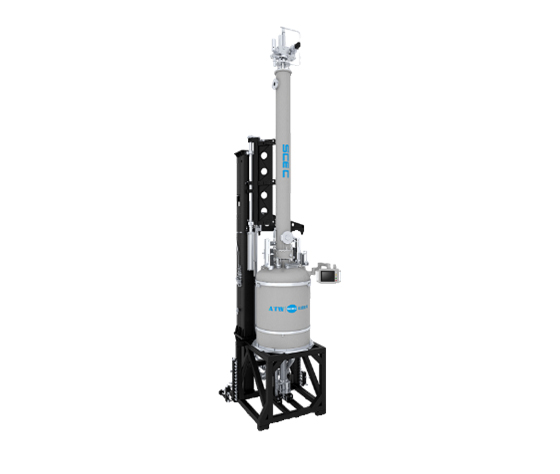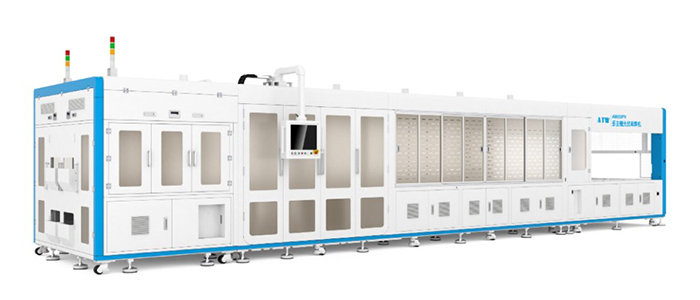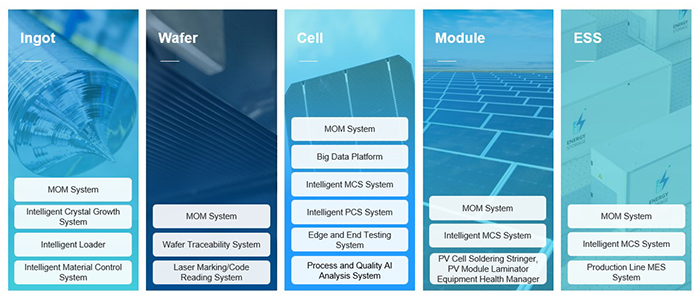- Home
-
How PV Manufacturers Can Achieve Production Line Automation and Smart UpgradesOCT. 20, 2025
As the world continues to shows interest in clean energy, the photovoltaic sector is experiencing growth that is far above anything previously noted. However, such growth is not without its challenges in smart upgrades which includes complex equipment integration, higher equipment precision standards, stricter process control, and growing demand for intelligent production. To remain competitive,manufacturers of photovoltaics should adopt autonomous production and intelligent enhancements.

The necessity of intelligent and automation upgrading of PV manufacturing
The more advanced the solar cells and modules become, the more precise the fabrication processes need to be in order to attain optimal performance and durability. Systems with heavy dependence on manual labor are no longer enough. Advanced intelligence and automated systems allow for:
Increased effectiveness: Minimizing the lengths of the cycle and the amount of labor involved.
Enhanced Product Stability, Predictability and Operational Efficiency: Eliminating faults during the production cycle, maintaining desired quality at every level of the production process, while enabling real-time process optimization and extremely early defect detection.
More Sustainable production: Assisting in the reduction of carbon emissions, energy use, and material waste.
Lack of smart automation in PV manufacture is not an option. It is a fundamental element of the overall strategy to follow.
Key Stages of PV Manufacturing and Smart Upgrade Pathways
1. Ingot and Wafer Production
The process begins with crystal growth and wafer preparation. These stages are energy-intensive and demand high precision. Automation can deliver significant improvements:
Crystal Growth Furnaces with Smart Control: Modern systems optimize temperature, oxygen reduction, and ingot removal processes, ensuring higher crystal quality with lower energy consumption.

Automated Wafer Inspection: Advanced vision systems, combined with AI algorithms, can detect micro-cracks, stains, or holes as small as 200 μm. Automated wafer handling and packaging lines also reduce breakage rates and boost throughput.
By digitizing and monitoring parameters such as thickness, resistivity, and micro-crack distribution, manufacturers can achieve more consistent wafer quality while reducing waste.
2. Cell Manufacturing
The cell production stage—covering diffusion, passivation, screen printing, and firing—is central to performance enhancement. Intelligent upgrades at this stage include:
Passivation and Firing Furnaces with Precise Control: Advanced systems help increase efficiency for PERC, TOPCon, and HJT cells, ensuring stable performance without light-induced degradation.
High-Speed Screen Printing Lines: Equipped with linear motors and real-time process monitoring, these lines deliver faster cycle times and superior alignment accuracy.

Logistics and Packaging Automation: Automated cell logistics systems enable smooth transfer, inspection, and packaging of cells, reducing reliance on manual labor and lowering defect rates.
Automation ensures every cell produced meets stringent efficiency standards, directly contributing to higher module performance.
3. Module Assembly
In the module stage, consistency and throughput are paramount. Automation ensures reliable interconnection and assembly:
Multi-Busbar Stringers and Laser Cutting Machines: High-speed stringers support advanced cell technologies such as 0BB, BC, and HJT, providing precise ribbon alignment and minimizing rework.

Layup and Bussing Systems: Integrated solutions combine string assembly, layup, and interconnection, reducing handling steps and improving yield rates, especially for thinner cells.
PV Module Laminators: Intelligent laminators with real-time temperature monitoring and uniform heating guarantee long-term reliability of modules, while accommodating diverse module types including BIPV and perovskite.
By integrating inline quality monitoring and AI-driven defect analysis, module assembly becomes faster, more reliable, and less wasteful.
4. Intelligent Manufacturing Systems
Automation extends beyond individual machines. A truly smart PV factory integrates data across the entire value chain:
MES and MOM Systems: Enable real-time traceability, scheduling optimization, and predictive maintenance.
Big Data and AI Analytics: Provide insights into process optimization, equipment health, and quality prediction.
Closed-Loop Management: Covers quality control, logistics, and process monitoring, ensuring continuous improvement.
These systems reduce downtime, shorten defect localization times, and enhance first-pass yield. For manufacturers, this means lower operating costs and faster delivery to customers.

Benefits Beyond the Production Floor
The benefits of production line automation and intelligence are not only reflected in manufacturing, but also bring you higher economic efficiency, greater environmental value, and stronger competitiveness, allowing you to stand out in the increasingly fierce competition in photovoltaic production.
Conclusion: Building the Future of PV Manufacturing
As solar power cements its role at the heart of global energy transition, manufacturers face mounting pressure to produce at scale, with quality, and with sustainability. Production line automation and smart upgrades are the pathways to achieving this balance.
Ready to take your PV production to the next level?
Autowell (ATW), with its comprehensive portfolio spanning ingot, wafer, cell, and module manufacturing equipment, offers proven solutions to help PV companies accelerate this automation transformation. Beyond its advanced, high-quality, and well-known core equipment in the industry (such as high-speed stringers), Autowell also leverages smart manufacturing systems including integrated manufacturing platforms and intelligent logistics to empower manufacturers to build smarter factories, improve efficiency, and achieve sustainable growth.
Contact Autowell today and explore how intelligent automation can future-proof your business!



